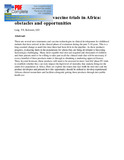| dc.contributor.author | Lang, TA | |
| dc.contributor.author | Kokwaro, GO | |
| dc.date.accessioned | 2013-06-10T11:45:25Z | |
| dc.date.available | 2013-06-10T11:45:25Z | |
| dc.date.issued | 2008 | |
| dc.identifier.citation | Trans R Soc Trop Med Hyg. 2008 Jan;102(1):7-10. Epub 2007 Oct 29 | en |
| dc.identifier.uri | http://www.ncbi.nlm.nih.gov/pubmed/17915267 | |
| dc.identifier.uri | http://erepository.uonbi.ac.ke:8080/xmlui/handle/123456789/30728 | |
| dc.description.abstract | There are several new treatments and vaccine technologies in clinical development for childhood malaria that have arrived in the clinical phase of evaluation during the past 5-10 years. This is a long-awaited change as until this time there had been little in the pipeline. As these products progress, evaluating them in the populations for whom they are being developed is becoming increasingly challenging. Many more capable trial sites are required and thousands of children and their parents need to be willing to take part in all the clinical trials that will be necessary if even a handful of these products make it through to obtaining a marketing approval license. Then, beyond licensure, these products will need to be assessed in more 'real-life' phase IV trials to establish whether they can truly impact the high level of mortality that malaria brings to the under-five population in Africa. Here we explore the issues that face both the trial sites and the product developers and present how this opportunity should be utilised to develop experienced African clinical researchers and facilities alongside getting these products through into public health use | en |
| dc.language.iso | en | en |
| dc.publisher | University of Nairobi | en |
| dc.title | Malaria drug and vaccine trials in Africa: obstacles and opportunities | en |
| dc.type | Article | en |
| local.publisher | College of Humanities Sciences | en |

